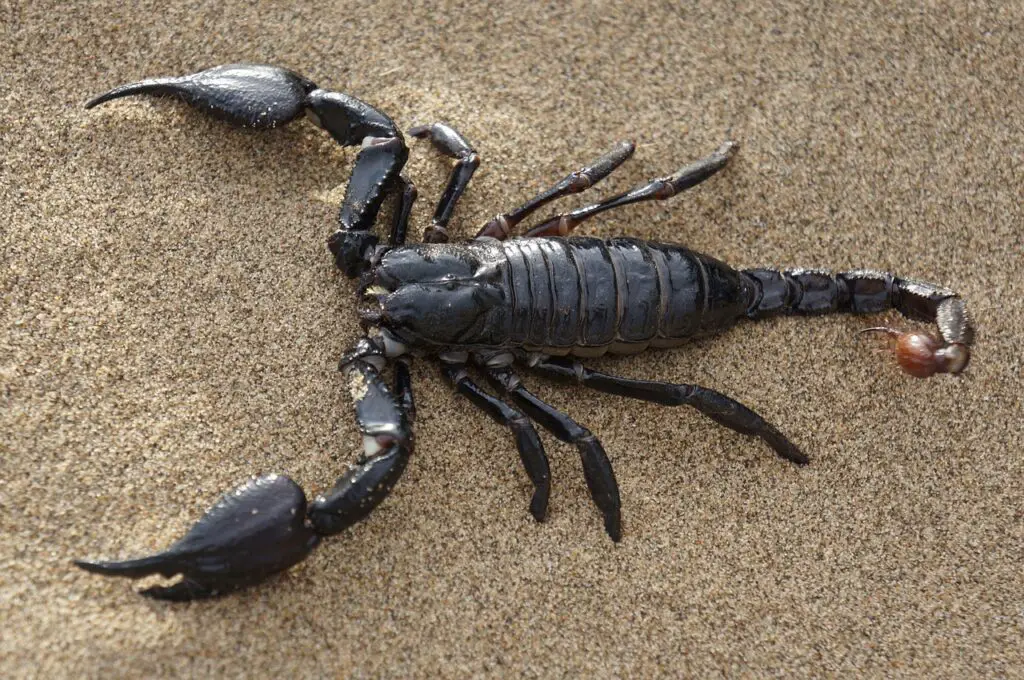Do scorpions attack humans? How do scorpions attack? Answered & Explained!
Do scorpions attack humans?
Yes, scorpions do attack humans but that’s very rare as they are very shy and peaceful animals that often remain hidden from human civilization.
But, though rare, they do sting humans. And if provoked, when the scorpion is in search of food or mate, then they can definitely sting.
It’s extremely rare that you will find anybody storytelling that they or their belongings were being stung by a scorpion.
Yeah, it’s a very aggressive creature as seen, when they hunt for their prey or when they try to defend from their predators.
Normally they are shy and peaceful, but during the time of hunting or defending themselves they become aggressive as reported by wildlife specialists.
So, scorpions do sometimes sting humans. Being super aggressive they do sometimes sting humans but not in the hope that they will get a large meal to feed upon, but in the hope to defend themselves.
So, as humans are much too big to be considered prey by scorpions. They will however react defensively and can try to sting aggressively if they feel threatened.
It’s a natural behaviour of the scorpion to sting anything that provokes it, whether in a mood to defend, hunt, or fight with other scorpions.
So, they can sting when they feel threatened by humans. As their sting is their best defense against being attacked or getting crushed under the human feet.

How do scorpions attack?
The scorpions are readily recognized by their elongated body with a flexible tail terminating in a sharp poison stinger. Their large front claws or pincers (also called pedipalps) often look frightening.
If you look from the front (mouth) side you will find a pair of Chelicerae which are the anterior-most, small, pincer-like sharp appendages that lie close together on either side of the mouth. Although small, Chelicerae look frightening as well.
Such a body make-out and structure with the presence of the above-mentioned appendages, the tail with the poison stinger, all make the scorpion look terrifying.
So, How do scorpions attack? To attack first the scorpions will slowly reach near the prey and then they will use the pincers to grasp the prey to stabilize it. Then it will arch its tail and will hit the prey with its pointed stinger to inject the venom into the prey.
They become aggressive when they attack. And as, the scorpions generally feed on small animals like insects or spiders, it is seen that the prey is simply crushed by the scorpion’s powerful grip.
They are very patient hunters, sitting for hours in one spot waiting for the prey to come too close. A scorpion will then snatch its prey with lightning speed and will sting it super fast.
Once the scorpion’s meal becomes paralyzed due to the venom action inside, it will feed upon the prey by tearing it apart by the pincers.
If the scorpion is attacking big organisms like humans, dogs, etc. then it’s very rare that they will use their pincers to grasp, but rather, it will simply arch its tail and inject the venom and then will run away.
Its sting is very pointed with a syringe-like structure. The sting is connected via. a duct with the venom gland.
The stinger, also known as the telson, lies at the tip of the scorpion’s tail. It features a bulb which is where the scorpion’s venom is produced by the venom gland and stored.
This venom goes through the tail and out of the stinger, to allow the venom to be secreted. After the venom is secreted, it goes into the prey’s body to paralyze it and eventually kill it.
Envenomation is the process by which a scorpion uses its tail to inject venom.
The striated muscles that are present in the stinger allow regulation of the amount of venom that is to be ejected by the contraction and relaxation of the muscles. Usually, 0.1 to 0.6 mg of venom is ejected at a time.
If the entire supply of venom in the sting is used and injected into the prey, then to refill the venom storage again the scorpion needs to wait several days (between 4 to 7 days).
It is also to be noted that the scorpions that are known to have large venom sacs, like that of the Parabuthus species, can even squirt their venom when threatened.
When do scorpions attack humans?
Scorpions do generally attack humans when they are being provoked, grabbed, or when they feel threatened.
Not deliberately they will always attack, as humans are much too big to be considered prey by scorpions. They will however react defensively if they feel threatened.
But, in rare cases, they will sting. And they look and act very aggressively when they attack, but soon after stinging they will try to run away as a way to defend themselves.
It has been seen that most scorpion stings occur when humans step on scorpions, or reach into an area where a scorpion is hiding.
They usually prefer to hide and stay in the dark beneath rocks and debris. So, better be careful and wear thick footwear like shoes, and boots before you try to visit such places.
Scorpions are nocturnal creatures and they will hide during the day. They hunt most often during the night time mostly in the bushes and gardens. So, be careful during the nighttime.
Also, make sure that you check your shoes before putting them on because that’s one of the favorite hiding spots of the scorpions, or else they may sting you.
Also, do check your bath towels and laundry piles as these are also common places to find scorpions hiding inside. Such cases are mostly seen in the scorpion prone areas.
Also, you can find them near a water source, so you may be able to see them in your kitchen, bathrooms, and laundry rooms as well. Better be careful with your acts mostly in the scorpion prone areas.
How do Scorpions affect humans? Can a scorpion kill a human being?
Scorpions are venomous to humans, but not all scorpions are deadly to humans. It’s because each species has its own unique nature of venom with different levels of toxicities.
This makes some of the species lethal and some non-lethal to humans at all.
The deadly scorpion’s venom can cause a massive release of neurotransmitters causing excessive sweating, nausea, vomiting, hypersalivation, restlessness, and in more severe cases, arrhythmia, unconsciousness, and heart failure, thus leading to death.
Scorpion’s neurotoxic venom contains chlorotoxin that inhibits and blocks the Chloride channels. Thus, due to this, the muscle cells are not able to detect when to relax or contract periodically, and as a result paralysis happens.
Another possible complication of scorpion stings, though rare, is a severe allergic reaction called anaphylaxis. During anaphylaxis, signs and symptoms may include a rapid and weak pulse; a skin rash; and nausea, and vomiting.
Also, not all scorpions are venomous. A majority of the scorpions are non-venomous and mild-venomous.
It has been estimated that only about 25 out of the 2,000 known species of Scorpion have fatal venom that is capable of killing a healthy adult human.
For example, Tityus serrulatus, Buthotus tamulus, Leiurus quinquestriatus, etc. are the deadly ones.
If you are being bitten by a mild-venomous one then it is to be noted that the scorpion will possess venom, but the sting normally results in swelling and pain similar to a bee sting.
The scorpion sting can be sometimes deadly to adults. But, children, the elderly, and immunocompromised people are mostly at risk even if they are stung by a mild-venomous scorpion.
After the sting, most probably the pierced body part of the victim will form swelling to medically significant lesions along with an extreme level of pain.
Some venomous to mild-venomous species are also able to cause severe allergic, neurotic, or necrotic reactions in the victim’s body when they sting.
Can scorpions jump at you?
Although they can jump, but not as effectively as other animals. Its very very rare to see them jump as they are nocturnal and remain hidden during the daytime.
You will often see them making small jumps during the time they hunt, or climb, or during their courtship behaviour at the time before they mate, or when they jump with small lifts across the barriers coming their way.
And don’t worry, they won’t jump at you, although they have the energy to jump or leap into action. Normally they do so when they see the food to hunt.
They usually try to defend from humans and will only sting you and then will simply run away after stinging, if highly threatened, but they will hardly jump.
This means that they only jump out of impulse and need. This is further supported by how scorpions can’t get out of a sink or tub once they get trapped in it.
Someone can even consider that scorpion jump action as leaping forward action, as that is not like a jump which we generally think of.
They are naturally designed right with their long abdomen and heavy front that better allows them to leap forward, though I don’t count that as jumping.
What should you do if you encounter a scorpion?
If you have encountered a scorpion better to get away from it. Don’t try to provoke it, grasp it, or hold it, or else it may bite you.
Also, make sure that you shake your shoes out before putting them back on, as there may be a scorpion hiding inside it.
Other areas scorpions can be found includes clutter, clothing piles, yard clipping, and bushes.
If you are stung by a scorpion then better to seek out for medical attention. Rush to your nearest hospital or medical care unit and get yourself treated as fast as possible.
At normal conditions, a person should see a doctor if they have symptoms that get worse within 2–3 hours of the sting.
And if the person enters into a much severe and potentially life-threatening condition that develops immediately following a sting person then, he or she needs emergency medical care as soon as possible.
After you are being stung, you can follow a common home remedy. That is, you can better clean the wound with mild soap and water, and apply a cool compress to the affected area. This may help reduce pain and swelling a bit.
The next is to run to your nearest medical care unit.
